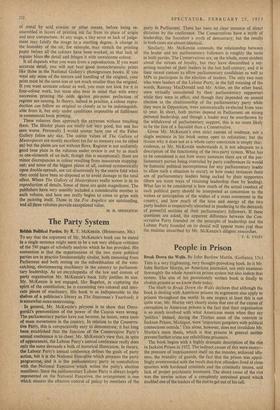The Party System
British Political Parties. By R. T. McKenzie. (Heinemann, 30s.) To say that the argument of Mr. McKenzie's book can be stated in a single sentence might seem to be a not very oblique criticism of the 590 pages of scholarly analysis which he has provided. His contention is that the organisations of the two main political parties are in practice fundamentally similar, both stemming from Parliament and both resting on the subordination of the vote- catching, electioneering machinery in the country to parliamen- tary leadership. As an encyclopmdia of the law and custom of party organisation Mr. McKenzie's book fully justifies its size. Mr. McKenzie is not engaged, like Bagehot, in capturing the spirit of the constitution; he is examining two colossal and intri- cate pieces of machinery. His book is as indispensable to the shelves of a politician's library as The Statesman's Yearbook; it is somewhat more entertaining. party in Parliament. There has been no clear instance of direct dictation by the conference. The Conservatives have a myth of leadership; the Socialists a myth of democracy; but the results in both cases are almost identical.
Similarly; Mr. McKenzie contends, the relationship between the leader and his parliamentary followers is roughly the same in both parties. The Conservatives arc, on the whole, more strident about the virtues of loyalty, but they have discomfited a sur- prising number of their leaders in the last half-century, and it is their recent custom to allow parliamentary candidates as well as MPs to participate in the election of leaders. The only two men who were leaders of the Labour Party, in the full meaning of the words, Ramsay MacDonald and Mr. Attlee, on the other hand, were virtually unmolested by their parliamentary supporters while they were in office, and though they depended on annual election to the chairmanship of the parliamentary party while they were in Opposition, were automatically re-elected from year to year. In short, both parties depend in Parliament on strong personal leadership, and though a leader may be overthrown by the withdrawal of parliamentary support, this is no more likely to be the fate of a Socialist than a Conservative.
Given Mr. McKenzie's own strict canons of evidence, not a single sentence in his book seems open to refutation; but the reason why it does not as a whole carry conviction is simply this: evidence, as Mr. McKenzie understands it, is not adequate to a description of the functioning of the two-party system. What has to be considered is not how many instances there are of the par- liamentary parties being overruled by party conferences (it would be fantastic political incompetence for any parliamentary leader to allow such a situation to occur), or how many instances there are of parliamentary leaders being sacked by their supporters (there are more ways of retaining leadership than by leading). What has to be considered is how much of the actual conduct of each political party should be interpreted as concession to the wishes or anticipation of the wishes of a mass movement in the country, and how much of the time and energy of the two party leaders is respectively absorbed in pandering to the demands of powerful sections of their parliamentary followers. If these questions are asked, the apparent difference between the Con- servative Party founded on the principle of leadership and the Labour Party founded on its denial will appear more real than the realities unearthed by Mr. McKenzie's diligent researches.










































 Previous page
Previous page